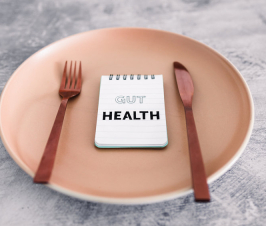Navigating Through the Diet Dilemmas
Dr. Sarah LoBisco, ND
@DrLoBisco
There’s so much conflicting information in every aspect of healthcare today. One of the most obvious examples is with dietary recommendations and weight loss. There are equally qualified experts on either side of the spectrums of high-fat, low-fat, high protein, vegetarian, paleo, intermittent fasting, and non-breakfast skippers. It’s enough to make your head spin and your belly grumble!1-7
In keeping with my functional medicine education of biochemical individuality and epigenetics, it makes sense to me why studies are so conflicting. There are so many factors to consider when implementing a dietary protocol for an individual. Besides current nutrient status, health state, and toxic exposure, many different influences modulate how food is used and transformed in one’s body. Below I discuss how these effect metabolism and weight.
The Many Aspects of Healthy Weight
- Microbiome composition. Besides all the immune-modulating and health effects that belly bugs modulate, several studies have demonstrated how the ratio of various critters in our bellies influences our waist line. Furthermore, our diet affects the diversity of our microbiota and this in turn impacts assimilation, absorption, and elimination. 8-9
- Quality of foods. It’s not just about quantity of foods, quality counts. Diets that contain processed foods and “liquid calories” have been shown to promote obesity due to consumption of excess empty calories.10 The Harvard School of Public Health states:
For chronic disease prevention, though, the quality and food sources of these nutrients matters more than their relative quantity in the diet. And the latest research suggests that the same diet quality message applies for weight control.10
- Stress. Stress impacts our hormonal levels and food choices which influences weight.11-12 In fact, in one prospective study, perceived stress and stressful events were positively associated with body mass index (BMI). 12
- Hormones. Sex hormones effect weight and influence food choices.13Furthermore, thyroid hormones have complicated interactions and feedback mechanisms in relationship to metabolism, fat storage, leptin, and insulin.14 finally, insulin and cortisol levels sway fat storage and weight.14
- Digestive health. You are what you (and your gut bugs) eat, absorb, eliminate, and assimilate.
- Activity level and exercise. Both are associated with maintenance of a healthy weight.15-18Interestingly, exercise seems to have the most benefit for maintaining weight.15A popular trend right now is high intensity interval training (HIT).16-18 It has been linked to many health benefits such as modulating insulin resistance and increasing metabolism.17However, these effects may be only in those who are in good enough shape to partake in the exercise, leaving out overweight and obese individuals.18 Therefore, choosing the right exercise can be as complicated as finding the optimal diet. Still, activity is important for health beyond weight and in general, staying active will help with controlling weight.
- Genetics. Variants in genes will determine how you burn calories with different types of exercise, detoxify environmental toxins, digest and assimilate, respond to stress, and if whether you are more sensitive to hormonal and glucose fluctuations.
- Gender. Several studies challenge the benefits of intermittent fasting in women, demonstrating the impact of gender on dietary patterns. 19-20
- Neurotransmitter balance. These brain signaling molecules affect mood and appetite regulation.21
- Toxins. Certain chemicals and environmental exposures have been termed “obsogenes” due to their impact on hormones and weight gain. 22
- Sleep. Studies have shown that sleep impacts weight through appetite regulation and hormonal balance.23-24 Sleep has many additional brain and health benefits as well.
5 Quick Remedies for a Confused Dieter Revealed
So, what’s a confused dieter to do? Here are some baseline guidelines to set you up for success.
Eat Real, Unprocessed Food
Eating whole, organic foods can assist with weight by modulating overall nutrient absorption and decrease the amount of inflammatory chemicals, pesticides, empty calories, and GMOs in your body.25
You may also want to consider removing some of the most triggering and inflammatory foods for the gut, such as gluten, dairy, and peanuts. Chronic inflammation from food sensitivities and intestinal inflammation can also cause weight gain.
Stay Active
As mentioned, exercise can help with weight maintenance and can modulate stress and appetite. This will affect weight long-term. For those who are inflamed and overly stressed, you may do better with calming exercise and weight resistance training, such as yoga. The calming effect of these exercises will positively influence weight more than inflaming and stressing your body more by “feeling the burn!”
Sleep
Sleep decreases inflammation and supports immune and brain health. It also determines appetite and satiety signaling. Lack of sleep also affects your gut bugs and this will also influence weight.26
Active relaxation
Stress can trump hormones, appetite, and blood sugar regulation. So, find some time to do something you love and commit to it daily, even if just for a little while.
Spend Time with Your Friends
Positive social connections can support your goals, decrease stress, and can have an influence on your behavior and resultant health outcomes.27
When Diet & General Advice Isn’t Enough
For those who seem to have “weight loss resistance,” check-in with a naturopathic or functional medicine doctor who can help you uncover and optimize the impact of all your unique and individualized biochemical factors that affect your weight.
 Sarah Lobisco, ND, is a graduate of the University of Bridgeport’s College of Naturopathic Medicine (UBCNM). She is licensed in Vermont as a naturopathic doctor and holds a Bachelor of Psychology from State University of New York at Geneseo. Dr. LoBisco is a speaker on integrative health, has several publications, and is a certification candidate in functional medicine. Currently, she is the Director of Clinical Education for an esteemed nutraceutical company.
Sarah Lobisco, ND, is a graduate of the University of Bridgeport’s College of Naturopathic Medicine (UBCNM). She is licensed in Vermont as a naturopathic doctor and holds a Bachelor of Psychology from State University of New York at Geneseo. Dr. LoBisco is a speaker on integrative health, has several publications, and is a certification candidate in functional medicine. Currently, she is the Director of Clinical Education for an esteemed nutraceutical company.
References:
- Weigle DS, Breen PA, Matthys CC, Callahan HS, Meeuws KE, Burden VR, et al. A high-protein diet induces sustained reductions in appetite, ad libitum caloric intake, and body weight despite compensatory changes in diurnal plasma leptin and ghrelin concentrations. Am J Clin Nutr. July 2005; 1:41-48. Available at: http://ajcn.nutrition.org/content/82/1/41.full. Accessed March 28, 2015.
- Chandra A, Neeland IJ, Berry JD, Ayers CR, Rohatgi A, Das SR, et al. J Am Coll Cardiol. 2014;64(10):997-1002. doi:10.1016/j.jacc.2014.05.057
- Barnard N. Low-Carb Beats ‘Low-Fat’? Take a Closer Look. Huffington Post. September 3, 2015. Available at: http://www.huffingtonpost.com/neal-barnard-md/diet-and-nutrition_b_5761450.html. Accessed March 28, 2015.
- Norton A. Low-Carb Beats Low-Fat for Weight Loss: Study: Still, experts agree there’s no one-size-fits-all diet. WebMD website. September 1, 2014. Available at: http://www.webmd.com/diet/news/20140901/low-carb-beats-low-fat-for-weight-loss-heart-health-study. Accessed March 28, 2015.
- Farshchi HR, Taylor MA, Macdonald IA. Moira A Taylor, and Ian A Macdonald, Deleterious effects of omitting breakfast on insulin sensitivity and fasting lipid profiles in healthy lean women. Am J Clin Nutr. July 2005; 82 (1): 41-48. Available at: http://ajcn.nutrition.org/content/81/2/388.full. Accessed March 28, 2015.
- Effects of a high-protein ketogenic diet on hunger, appetite, and weight loss in obese men feeding ad libitum. Am J Clin Nutr. January 2008; 87(1):44-55.
- National Institute of Aging. NIH study finds calorie restriction does not affect survival. NIA website. August 29, 2012. Available at: http://www.nia.nih.gov/newsroom/2012/08/nih-study-finds-calorie-restriction-does-not-affect-survival. Accessed September 8, 2014.
- David LA, Maurice CF, Carmody RN, Gootenberg DB, Button JE, Wolf BE, et al. Diet rapidly and reproducibly alters the human gut microbiome. Nature. January 23, 2014. 505: 559-563. doi:10.1038/nature12820
- Larsen N, Vogensen FK, van den Berg FW, Nielsen DS, Andreasen AS, Pedersen BK, Al-Soud WA, et al. Gut microbiota in human adults with type 2 diabetes differs from non-diabetic adults (abstract). PLoS One. 2010 Feb 5;5(2):e9085.
- Harvard TH Chan School of Public Health. Obesity prevention sources: Food & Intake. Harvard School of Public Health Obesity Source Prevention Website. Available at: http://www.hsph.harvard.edu/obesity-prevention-source/obesity-causes/diet-and-weight/ Accessed March 28, 2015.
- Roberts C, Troop N, Connan F, Treasure J, Campbell IC. The effects of stress on body weight: biological and psychological predictors of change in BMI (abstract).Obesity. 2007 Dec;15(12):3045-55. doi: 10.1038/oby.2007.363.
- Harding JL, Backholer K, Williams ED, Peeters A, Cameron AJ, Hare MJ, Shaw JE, Magliano DJ. Psychosocial stress is positively associated with body mass index gain over 5 years: evidence from the longitudinal AusDiab study. Obesity. 2014 Jan;22(1):277-86. doi: 10.1002/oby.20423. Epub 2013 Jun 13.
- Lovejoy JC. The influence of sex hormones on obesity across the female life span (abstract). J Womens Health. 1998 Dec;7(10):1247-56.
- Santini F, Marzullo P, Rotondi M, Ceccarini G, Pagano L, Ippolio S, et al. Mechanisms in Endocrinology: The crosstalk between thyroid gland and adipose tissue: signal integration in health and disease. doi: Eur J Endocrinol. October 1, 2014. 10.1530/EJE-14-0067
- Lee IM, Djousse L, Sesso HD, Wang L, Buring JE. Physical activity and weight gain prevention. JAMA. 2010; 303:1173-9.
- Masuki S, Mori M, Tabara Y, Sakurai A, Hashimoto S, Morikawa M, et al. The factors affecting adherence to a long-term interval walking training program in middle-aged and older people. J Appl Physiol (1985). 2015 Mar 1;118(5):595-603. doi: 10.1152/japplphysiol.00819.2014.
- Little JP, Gillen JB, Percival ME, Safdar A, Tarnopolsky MA, Punthakee Z, Jung ME, Gibala MJ. Low-volume high-intensity interval training reduces hyperglycemia and increases muscle mitochondrial capacity in patients with type 2 diabetes. Journal of Applied Physiology .1985; 111(6): 1554-60.
- De Feo P . Is high-intensity exercise better than moderate-intensity exercise for weight loss? Nutr Metab Cardiovasc Dis. 2013 Nov;23(11):1037-42. doi: 10.1016/j.numecd.2013.06.002. Epub 2013 Oct 9.
- Varady KJ, Hellerstein MK. Alternate-day fasting and chronic disease prevention: a review of human and animal trials. Am J Clin Nutr. July 2007; 86(1): 7-13.
- Ruper S. Shattering the Myth of Fasting for Women: A Review of Female-Specific Responses to Fasting in the Literature. Paleo for Women [website]. June 4, 2012. Available at: http://paleoforwomen.com/shattering-the-myth-of-fasting-for-women-a-review-of-female-specific-responses-to-fasting-in-the-literature/
- Wurtman J. Serotonin: What It is and Why It’s Important for Weight Loss. Psychology Today. August 5, 2010. Available at: https://www.psychologytoday.com/blog/the-antidepressant-diet/201008/serotonin-what-it-is-and-why-its-important-weight-loss. Accessed March 28, 2015.
- Grün F. Obesogens. Curr Opin Endocrinol Diabetes Obes. 2010 Oct;17(5):453-9. doi: 10.1097/MED.0b013e32833ddea0.
- Spivey A. Lose Sleep, Gain Weight: Another Piece of the Obesity Puzzle. Environmental Health Perspectives. 2010;118(1):A28-A33.
- Cell Press. Jet lag can cause obesity by disrupting the daily rhythms of gut microbes. Sceince Daily. October 16, 2014. Available at: http://www.sciencedaily.com/releases/2014/10/141016123522.htm
- Fung, B. Organic Food Isn’t More Nutritious, but That Isn’t the Point. September 4, 2012. The Atlantic. Available at: http://www.theatlantic.com/health/archive/2012/09/organic-food-isnt-more-nutritious-but-that-isnt-the-point/261929/
- Thaiss CA, Zeevi D, Levy M, Zilberman-Schapira G, Suez J, Tengeler AC, et al. Trans-kingdom control of microbiota diurnal oscillations promotes metabolic homeostasis. Cell. 2014. doi: 10.1016/j.cell.2014.09.048
- Carson TL, Eddings KE, Krukowski RA, Love SJ, Harvey-Berino JR, West DS. Examining Social Influence on Participation and Outcomes among a Network of Behavioral Weight-Loss Intervention Enrollees. Journal of Obesity. 2013. doi:10.1155/2013/480630.

















